Complete Solutions to MULTIPLE CHOICE QUESTION (LEVEL-I) of chapter DESCRIPTION OF MOTION IN ONE DIMENSION of Class 12 book with complete answers and questions
| Class 12 | PHYSICS |
| Chapter | DESCRIPTION OF MOTION IN ONE DIMENSION |
| MODERN PUBLICATION | MULTIPLE CHOICE QUESTION (LEVEL-I) |
| Number Of Questions | 83 |
| Academic Year | 2023-24 |
A boy throws a ball in air in such a manner that when the ball is in its max. height, he throws another ball. If the balls are thrown after the time difference of 1 s, then what will be the height attained by them:
View SolutionA bus starts from rest with an acceleration of 1 `m//s^(2)` A man who is 48 m behind the bus starts with a uniform velocity of 10 m `s^(-1)`. Then after how much time the man will catch the bus ?
View SolutionA body is released from the top of a tower of height metre. It takes time T seconds to reach the ground. Where is the body at time `T/2`seconds?
View SolutionThe displacement y (in metres) of a body varies with time T (in sec.) as `y=(-3)/(2)t^(2)+36t+2`. How long does the body takes to come to the rest ?
View SolutionA body experiences acceleration for 6 seconds after starting from rest. If it travels a distance `x_1` in first 2 s, `x_2` in the next two s, and `x_3` in the last two s. then :
View SolutionThe velocity of a particle is given by `v = 3+6 (a_1 + a_2 t)` where a, and an are constants and t is time. The acc. of particle is:
View SolutionOn a velocity time graph of a body, the ratio of average acceleration during time interval OA and AB is:
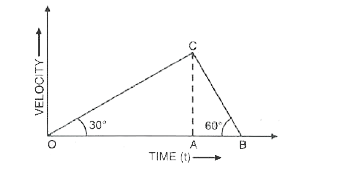
View SolutionA bullet fired into a target loses half of its velocity after penetrating 36 cm. Further distance covered by it before coming to rest will be
View SolutionA balloon is going vertically upward with a velocity of 15 `ms^-1`. When it is at a height of 50 m above the ground a stone is gently dropped from it. The stone will reach the ground in time (take g = 10 `ms^-2)`:
View SolutionA train is moving with a speed of 54 km/h. A monkey is running on the roof of a train against its motion with a speed of 5 ms. w.ut the train. The velocity of the monkey as observed by a man on the ground is :
View SolutionA particle moving in straight line cover half the distance with speed `3 ms^-1`. The other half is covered in two equal time intervals with speed `4.5 ms^-1 and 7.5 ms^-1` respectively. The average speed of the particle during motion is
View SolutionA 120 m long train is moving towards west at a speed of 10 `ms^(-1)`.A small bird flying towards east at a speed of 5 ` ms^(-1)` crosses the train. What is time taken by the bird to cross the train :
View SolutionA body moves along a circular track of radius R. It starts from one end of a diameter and reaches the other end of diameter. What is the ratio of the distance travelled by the body to its displacement :
View SolutionA car accelerates from rest at a constant rate a for some time after which it retards at a constant rate to come to rest. If the time elapsed is t, maximum velocity reached is
View SolutionThe displacement of a particle moving in one dimension under the action of a constant force is related to timer by the equation `t= sqrt(x + 3)`, where x is in metres and in second. What is the displacement of particle when its velocity is zero?
View SolutionA car accelerates from rest at constant rest a `alpha` t for same time after which it deaccelerates at constant rate `beta` to come to rest. If total time taken is t then distance covered is given by :
View SolutionA Body start from origin and move along x-axis such that velocity at any instant is given by `4t^(3)-2t` is in second and velocity in m/s Find acceleration of the particle when it is at a distance of 2 m from the origin:
View SolutionTennis ball is dropped on the floor from a height of 100 m. It rebounds to a height of 100 m. Ir the ball was in contact with the floor for 3.16 3. then the average acceleration during the contact is:
View SolutionThe relation between time and displacement is `t=alphax^(2)+betax` where `alpha` and `beta` are constants. What is retardation of the body:
View SolutionA freely falling body, falling from a tower of heighth covers a distance h/2 in the last second of its motion The height of the tower is 10 `ms^(-2)`):
View SolutionA car starting from rest, accelerates at a constant rate of 5 ms for some time. It then retards at a constant rate of 10 ms and finally comes to rest. If the total time taken is 6 s, what is the maximum speed attained by the car:
View SolutionA body is dropped from a height of 125 m. If = 10 `ms^(-2)` what is the ratio of the distances travelled by it during the first and last second of its motion :
View SolutionA car moving at a speed v is stopped in a certain distance when the brakes produce a deceleration a. If the speed of car was nv , what must be the decceleration of the car to stop it in the same distance and in the same time?
View SolutionThe distance x covered by a body moving in a straight line in time is given by the relation 2 + 3x = t. If is the velocity of the body at a certain instant of time, its acceleration will be
View SolutionA body is moved along a straight line by a machine delivering constant power, the distance moved by the body in time in proportional to :
View SolutionTwo buses leave with a minute gap and move with acceleration of 0.2 ms - How long after the departure of the second bus do the distance hew them become equal to three times its initial value?
View SolutionThe two ends of a train moving with a constant acceleration pass a certain point with velocities M and w. The velocity with which the middle point of a train passes the same point is:
View SolutionA stone is thrown upwards from the top of a tower with some initial speed and it reaches the ground in second. Now it is allowed to fall with the same initial speed downward and it reaches the ground in 1 second In how much time will it reach the ground if the stone is allowed to fall freely under gravity from the same place:
View SolutionA body starting from rest moves along a straight line with constant acceleration. The variation of speed (v) and distance (x) is given by graph represented in:
View SolutionGiven the graph of velocity of material point as a function of time. The plot of acceleration of the particle as a function of time is given as:
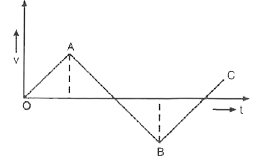
View SolutionA car covers `(1)/(3)`part of total distance with a speed of 20 km `h^(-1)` and second `1 /3`and the last part with a speed of 60 km `h^(1)` The average speed of the car is:
View SolutionA bus is moving along a straight road with a uniform acceleration. It passes through two points A and B separated by a distance with velocity 30 km/h and 40 kmh respectively. The velocity of the bus midway between A and B is:
View SolutionThe velocity time graph of a body moving along a straight line is shown in Fig. The acceleration of the body during OA will be:
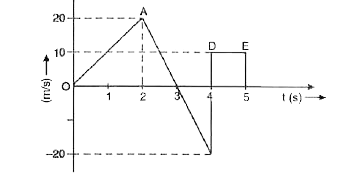
View SolutionA boy completes one round of a circular track of radius "R' in 40 What will be his displacement at the end of 2 minutes 20 second
View SolutionThe velocity versus time curve of a moving point is as given ahead:
The maximum acceleration is :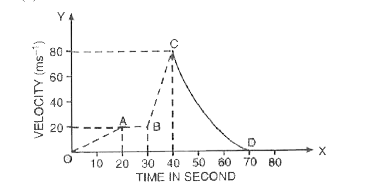
View SolutionA man in a balloon rising vertically with an acceleration of 4.9 ms releases a ball 2 second after the balloon is let go from the ground. The greatest height above the ground reached by the ball is:
View SolutionA car completes the first half of its journey with a velocity `upsilon_(1)` and the rest half with a velocity `upsilon_(2)`. Then the average velocity of the car for the whole journey is :
View SolutionFour boys are standing at the four comers of a square ABCD of length of sideal. They simultaneously start running such that runs towards B, B runs towards C, C runs towards D and D runs towards A each with velocity . They will meet at after time given by :
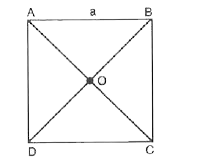
View SolutionA body when released from the top of a tower of height h reaches the ground in time T. At what time it is at a height `h/2`above the ground?
View SolutionA bullet loses `1/20` of its velocity in passing through one plank What is the minimum number of plank's required to stop the ballet:
View SolutionWhich of the following is a false statement :
View SolutionA person throws ball with velocity from the top of a building in vertically upward direction the ball reaches the ground with a speed of 3v then the height of the building is :
View SolutionA body is released from a great height and falls freely under gravity vertically towards eurth. Another body is released from the same height exactly one second later from the same point. Separation between the two after 2 second of release of the second body is :
View SolutionA parachutist after bailing out falls 50 m without friction When parachute opens, he descends at 2 ms and reaches the ground with a speed of 3 m l At what height did he bailout ?
View SolutionA man is throwing balls in air. He throws next ball when previous one is at the highest point. If he throws each ball after 2s , then height to which ball rises is
View SolutionThe displacement of a particle is represented by following equation:
`s=3t^(3) +7t^(2) +5t +8`
where is in metre and in second the acceleration of particle at s is
View SolutionTwo particles A and B are connected by a rigid rod AB. The rod slides along perpendicular rails as shown. The velocity of A to the left is 10 `ms^(-1)` What is the velocity of B when angle`alpha=60^(@)`?
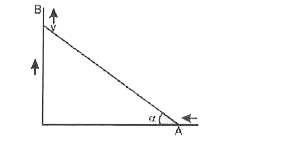
View SolutionA car moving with a speed of 40 km/h can be stopped by applying brakes after at least 2 m. If the same car is moving with 80 km/h, what is the least stopping distance ?
View SolutionA rubber ball is dropped from a height of 5 m on a planet where the acceleration due to gravity is not known. On bouncing it rises to 1.8 m. The ball loses its velocity on bouncing by a factor of:
View SolutionThe displacement X (in meters) of a body varies with time (in sec) as `x=- (4)/(5)t^(2) + 16+ + 20`. The velocity of body will be zero at time:
View SolutionA stone, dropped from a certain height can reach the ground in 10 s. If it is stopped after 5 s of its fall and then allowed to fall again, find the time taken by it to reach the ground for the remaining distance.
View SolutionA truck crosses a stationary motorcycle at a speed of 54 km/h. At the same instant, the motor cyclist follows the truck by accelerating his motorcycle at the rate of 1 ms. The motor cyclist catches the truck after a time interval of:
View SolutionA particle starts from rest and travels a distance 's' with uniform acceleration, then it travels a distance '2s' with uniform speed and finally it travels a distance '38' with uniform retardation and comes to rest. If whole motion is in a straight line, the ratio of maximum velocity to average velocity is
View SolutionA particle thrown vertically upwards has velocity 10 `ms^(-1)` at half of its height, then maximum height attained by it is :
View SolutionA car completes the first half of its journey with a velocity `upsilon_(1)` and the rest half with a velocity `upsilon_(2)`. Then the average velocity of the car for the whole journey is :
View SolutionThe numerical ratio of average velocity to average speed is
View SolutionA particle starts from rest and has acceleration of 2 ms-2 for 10 s. After that it travels for 30 s. with constant speed and then undergoes a constant retardation of 4 ms and comes back to rest. The total distance covered by the particle is:
View SolutionIf a car at rest accelerates uniformly to a speed of 144 km/h in 20 s, it covers a distance of:
View SolutionThe position x of a particle varies with time t as `x = at^(2) -bt^(3)`. For what value of time acceleration is zero?
View SolutionThree different objects of masses `m_1 m_2`and `m_3` are allowed to fall from rest from the same point along three different frictionless paths, the speeds of the three objects on reaching the ground, will be in the ratio
View SolutionTwo cars are moving in the same direction with a speed of 30 kmh. They are separated from each other by 5 km. Third car moving in the opposite direction meets the two cars after an interval of 4 minutes. What is the speed of the third car ?
View SolutionA particle is moving along a straight line path according to the relations `s^(2)=at^(2)+2bt+c`
represent the distance travelled in t seconds and a, b, c are constant. Then the acceleration of the particle varies as:
View SolutionA ball is thrown vertically upwards. Which of the following plots represents the speed-time graph of the ball during its flight in the air (resistance of air is not ignored)?
View SolutionA body moves for a total of nine seconds starting from rest with uniform acceleration and then with uniform retardation, which is twice the value of acceleration and then stops. The duration of uniform acceleration is:
View SolutionA body falls from a heighth = 200 m. The ratio of distance travelled in each 2, during != 0 to 6 second of the journey is:
View SolutionA man throws balls with the same speed vertically upwards one after the other at an interval of 2 second. What should be the speed of the throw so that two balls are in the sky at any time?
View SolutionWhich of the following position-time graph represent uniform motion ?
View SolutionA student is standing at a distance of 50 metre from the bus. As soon as the bus begins its motion with an acceleration of `1m//s^(2)`, the student starts running towards the bus with a uniform velocity u. assuming the motion to be along a straight road, the minimum value of u. so that the student is able to catch the bus is
View SolutionA balloon is rising vertically up with a velocity of 29 `ms^(-1)`. A stone is dropped from it and it reaches the ground in 10 seconds. The height of the balloon when the stone was dropped from it is
View SolutionA particle moves along a straight line OX. At a time (in second) the distance x (in metre) of the particle from "O' is given by : `x=40+12t-t^(3)` How long particle travels before coming to rest ?
View SolutionA body initially at rest is moving with uniform acceleration 'a'. It's velocity after n seconds is v. The displacement of the body in last 2 seconds is:
View SolutionA particle moves with constant acceleration a and `v_1 v_2 v_3` . are its average velocities in the three successive intervals`t_1 t_2` and `t_3` is of time. Then which relation out of the following holds good for its motion ?
View SolutionA body starting from rest moves with constant acceleration 'a'. This acceleration is a pr where p is a constant. What is the displacement of particle in a time interval=0 to t = `t_1` ?
View SolutionA body falls from rest. In the last second of its fall, it covers half of the total distance then the total time of its fall is
View SolutionIn the above question `"(A body falls from rest. In the last second of its fall, it covers half of the total distance)"` the total height of fall is :
View SolutionA small block slides without friction down an inclined plane starting from rest. Lets `s_n` be the distance travelled from time t=n - 1 to t = n. Then `(S_n)/(s_n+1)` is:
View SolutionA parachutist after bailing out falls 50 m without friction When parachute opens, he descends at 2 ms and reaches the ground with a speed of 3 m l At what height did he bailout ?
View SolutionA particle located at x = 0 at time t=0 starts moving along positive x-direction with velocity v that varies as `v = asqrt(x)`. The displacement of the particle varies with time as :
View SolutionA car moving with a speed of 50 km/h, can be stopped by brakes after at least 6 m. If the same car is moving at a speed of 100 km/h, the minimum stopping distance is :
View SolutionAn automobile travelling with a speed of 60 km/h, can brake to stop within a distance of 20 m. If the car is moving twice as fast i.e. 120 km/h, the stopping distance will be
View SolutionA bullet fired into a fixed target loses half of its velocity after penetrating 3 cm. How much further it will penetrate before coming to rest assuming that it faces constant resistance to motion ?
View SolutionThe relation between time and displacement is `t=alphax^(2)+betax` where `alpha` and `beta` are constants. What is retardation of the body:
View SolutionA car, starting from rest, accelerates at the rate f through a distance S, then continues at constant speed for time t and then decelerates at the rate `f/2` to come to rest. If the total distance traversed is 5 S, then :
View Solution
MULTIPLE CHOICE QUESTION (LEVEL-I) questions and complete solutions for chapter DESCRIPTION OF MOTION IN ONE DIMENSION of MODERN PUBLICATION PHYSICS (KANNADA ENGLISH) of Class 12